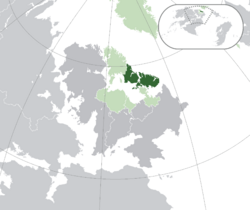Rosland-Iskrell
This article is incomplete because it is pending further input from participants, or it is a work-in-progress by one author. Please comment on this article's talk page to share your input, comments and questions. Note: To contribute to this article, you may need to seek help from the author(s) of this page. |
Federal Republic of Rosland-Iskrell | |
|---|---|
Coat of arms
| |
| Motto: Vi står fast ("We stand firm") | |
| Anthem: "Nordmarch" "Norra Marsch" "Northern March" | |
 | |
| Capital and largest city | Ornsholt |
| Official languages | Iskronish Roskan |
| Ethnic groups (2023) | 53.2% Iskronish 34.3% Roskan 12.5% other |
| Religion (2023) | 63.4% Gregorianism 32.5% Irreligious 4.1% Others |
| Demonym(s) | Roskan-Ishrish Iskronish Roskan |
| Government | Federal parliamentary republic |
| Svend Sørensen | |
| Casper Öberg | |
| Ulf Mørk | |
| Irma Hagström | |
| Legislature | Folkemødet |
| Establishment | |
• TBA | TBA |
• TBA | TBA |
• TBA | TBA |
• TBA | TBA |
• TBA | TBA |
• TBA | TBA |
| Area | |
• Total | 285,049 km2 (110,058 sq mi) |
• Water (%) | 3.8 |
| Population | |
• 2024 estimate | |
• 2022 census | |
• Density | 169.1/km2 (438.0/sq mi) |
| GDP (PPP) | 2022 estimate |
• Total | |
• Per capita | |
| GDP (nominal) | 2022 estimate |
• Total | |
• Per capita | |
| Gini (2022) | medium |
| HDI (2022) | very high |
| Currency | Pund (RIP) |
| Time zone | UTC±0 |
| Date format | dd-mm-yyyy |
| Driving side | left |
| Calling code | +38 |
| Internet TLD | .ri |
Rosland-Iskrell (Iskronish and Roskan: Roskarn-Iskrona), officially the Federal Republic of Rosland-Iskrell (Iskronish: Forbundsrepublikken Roskarn-Iskrona, Roskan: Förbundsrepubliken Roskarn-Iskrona), is a sovereign state located in Svalland in Northern Calesia. It lies between the North Sea to the north, Waldrich to the west, and the Swarin Sea and East Ruthen to the south. Remote Kongerikøen Island, located in the South Medan Ocean, is a dependency of Rosland-Iskrell. The capital and largest city in Rosland-Iskrell is Ornsholt.
Roskarn-Iskrona was part of the Waldic Empire from the 9th century until the early 11th century. Following the sack of Sydenham in 1031, the Empire transitioned into a loose defensive alliance called the Old Waldish Confederacy. This Confederacy remained largely untouched until the Catabole in the mid-14th century. During the !Reformation, most of the Roskans and Iskronish embraced Presterism. In 1472, Presterist nobles launched a rebellion against the repression from Alsvik, igniting a continental war that ultimately led to Waldrich's defeat. In the aftermath, nobles from Roskarn and Iskrona swiftly formed a personal union under King Olaf I of Iskrona. This kingdom, alongside the Ruthish Confederation, became one of the few major Presterist powers in Calesia and even established a small colony in Elia Australis. The kingdom also established a modest colonial empire in Hylasia, however maintaining low influence in Calesia. Industrialization progressed slowly, and increasing tensions between the Presterist elite and the emerging labor class led to growing internal divisions.
By the mid-19th century, widespread frustration over economic stagnation and the monarchy’s detachment led to peaceful protests, culminating in Christian VII of Roskarn-Iskrona’s voluntary abdication and the monarchy’s dissolution in 1839. Roskarn-Iskrona, a staunch ally of Waldrich, swiftly joined the Transmedan Powers at the start of the Great War but was soon invaded by Ruthish forces, leading to a brutal five-year conflict. The tide turned in 1938 with the liberation of the capital in August, and by late 1939, Ruthish forces were fully expelled. The nation has remained a loyal ally of Waldrich, playing an increasingly active role in international politics after the Great War. It has participated in the Chaibian War and contributed to the UCMAR peacekeeping force. Economically, Roskarn-Iskrona began to prosper significantly in the 1970s, when oil began to be pumped from the North Sea. The country assembled a sizable state-owned company sector relatively quickly to support the state economy, and the country's standard of living began to rise.
[something about politics]
[something about the economy]

